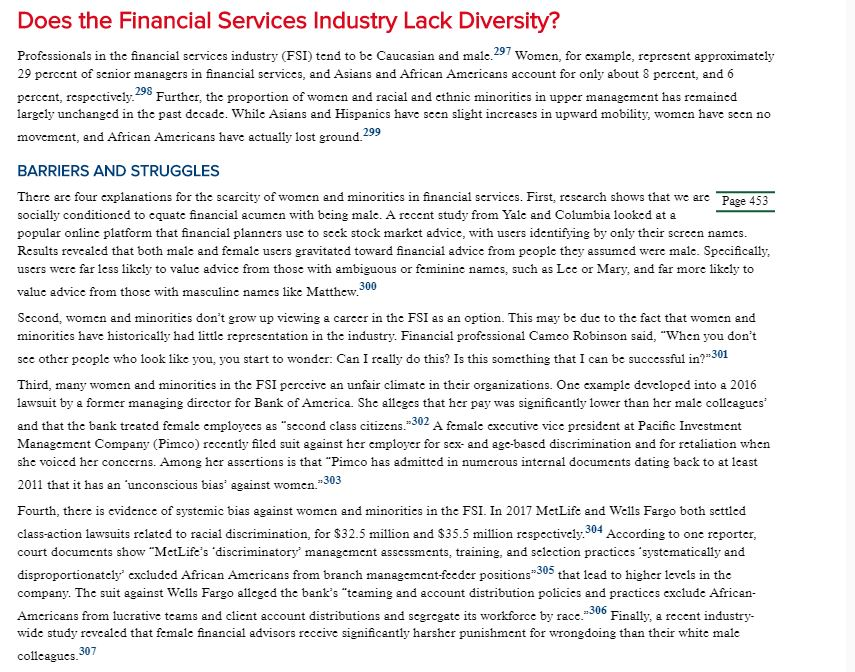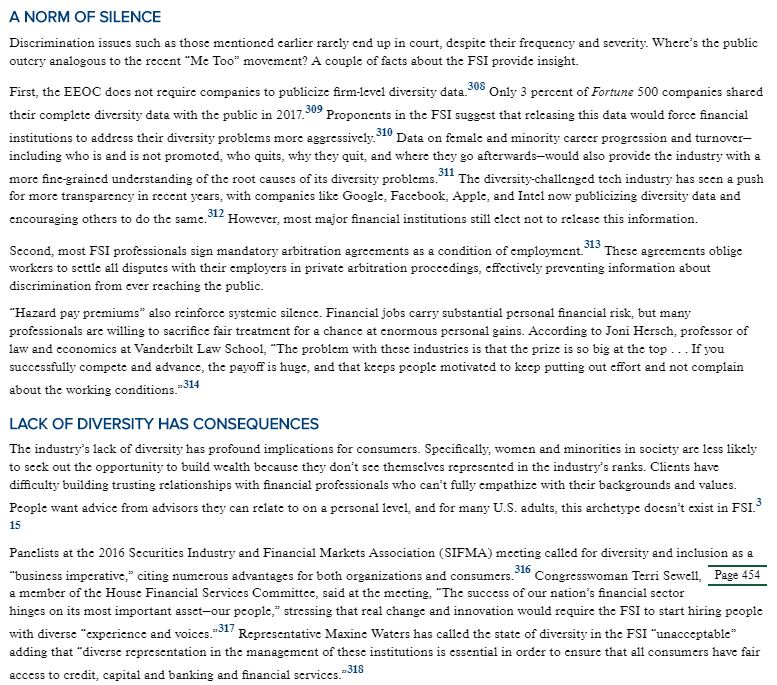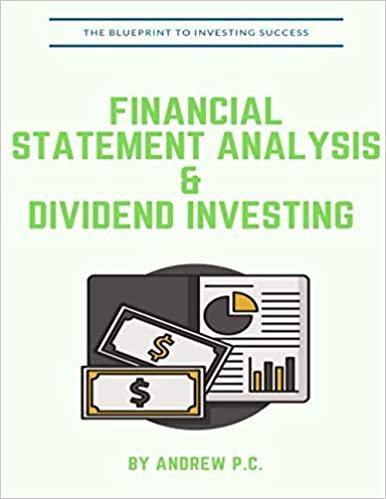1. What is the underlying problem in this case from the FSIs perspective?
2. What role do you believe financial service industry leaders have had in allowing the lack of progress toward increasing diversity and inclusion?
3. What if anything do you believe the government should do to encourage more understanding of, and progress toward solving, the industrys diversity problems?


Does the Financial Services Industry Lack Diversity? Professionals in the financial services industry (FSI) tend to be Caucasian and male.29 Women, for example, represent approximately 29 percent of senior managers in financial services, and Asians and African Americans account for only about 8 percent, and 6 percent, respectively. Further, the proportion of women and racial and ethnic minorities in upper management has remained largely unchanged in the past decade. While Asians and Hispanics have seen slight increases in upward mobility, women have seen no movement, and African Americans have actually lost ground.499 BARRIERS AND STRUGGLES There are four explanations for the scarcity of women and minorities in financial services. First, research shows that we are Page 453 socially conditioned to equate financial acumen with being male. A recent study from Yale and Columbia looked at a popular online platform that financial planners use to scck stock market advice, with users identifying by only their screen names. Results revealed that both male and female users gravitated toward financial advice from people they assumed were male. Specifically users were far less likely to value advice from those with ambiguous or feminine names, such as Lee or Mary, and far more likely to value advice from those with masculine names like Matthew. Second, women and minorities don't grow up viewing a career in the FSI as an option. This may be due to the fact that women and minorities have historically had little representation in the industry. Financial professional Camco Robinson said, "When you don't see other people who look like you, you start to wonder: Can I really do this? Is this something that I can be successful in?" 301 Third, many women and minorities in the FSI perceive an unfair climate in their organizations. One example developed into a 2016 lawsuit by a former managing director for Bank of America. She alleges that her pay was significantly lower than her male colleagues' and that the bank treated female employees as "second class citizens.-302 A female executive vice president at Pacific Investment Management Company (Pimco) recently filed suit against her employer for sex-and age-based discrimination and for retaliation when she voiced her concerns. Among her assertions is that "Pimco has admitted in numerous internal documents dating back to at least 2011 that it has an 'unconscious bias' against women."303 Fourth, there is evidence of systemic bias against women and minorities in the FSI. In 2017 MetLife and Wells Fargo both settled class-action lawsuits related to racial discrimination, for $32.5 million and $35.5 million respectively. 04 According to one reporter, court documents show "MetLife's discriminatory' management assessments, training, and selection practices systematically and disproportionately excluded African Americans from branch management-feeder positions"305 that lead to higher levels in the company. The suit against Wells Fargo alleged the bank's "teaming and account distribution policies and practices exclude African- Americans from lucrative teams and client account distributions and segregate its workforce by race.-306 Finally, a recent industry- wide study revealed that female financial advisors receive significantly harsher punishment for wrongdoing than their white male colleagues 307 A NORM OF SILENCE Discrimination issues such as those mentioned carlier rarely end up in court, despite their frequency and severity: Where's the public outcry analogous to the recent "Me Too movement? A couple of facts about the FSI provide insight. First, the EEOC does not require companies to publicize firm-level diversity data 500 Only 3 percent of Fortune 500 companies shared their complete diversity data with the public in 2017.- Proponents in the FSI suggest that releasing this data would force financial institutions to address their diversity problems more aggressively: Data on female and minority career progression and turnover- including who is and is not promoted, who quits, why they quit, and where they go afterwards-would also provide the industry with a more fine-grained understanding of the root causes of its diversity problems. The diversity-challenged tech industry has seen a push for more transparency in recent years, with companies like Google, Facebook, Apple, and Intel now publicizing diversity data and encouraging others to do the same. However, most major financial institutions still elect not to release this information. Second, most FSI professionals sign mandatory arbitration agreements as a condition of employment. These agreements oblige workers to settle all disputes with their employers in private arbitration proceedings, effectively preventing information about discrimination from ever reaching the public. "Hazard pay premiums" also reinforce systemic silence. Financial jobs carry substantial personal financial risk, but many professionals are willing to sacrifice fair treatment for a chance at enormous personal gains. According to Joni Hersch, professor of law and economics at Vanderbilt Law School, "The problem with these industries is that the prize is so big at the top ... If you successfully compete and advance, the payoff is huge, and that keeps people motivated to keep putting out effort and not complain about the working conditions.-314 LACK OF DIVERSITY HAS CONSEQUENCES The industry's lack of diversity has profound implications for consumers. Specifically, women and minorities in society are less likely to seek out the opportunity to build wealth because they don't see themselves represented in the industry's ranks. Clients have difficulty building trusting relationships with financial professionals who can't fully empathize with their backgrounds and values. People want advice from advisors they can relate to on a personal level, and for many U.S. adults, this archetype doesn't exist in FSI 15 Panelists at the 2016 Securities Industry and Financial Markets Association (SIFMA) meeting called for diversity and inclusion as a "business imperative," citing numerous advantages for both organizations and consumers." Congresswoman Terri Sewell Page 454 a member of the House Financial Services Committee, said at the meeting. "The success of our nation's financial sector hinges on its most important asset-our people," stressing that real change and innovation would require the FSI to start hiring people with diverse "experience and voices.* Representative Maxine Waters has called the state of diversity in the FSI "unacceptable" adding that "diverse representation in the management of these institutions is essential in order to ensure that all consumers have fair access to credit, capital and banking and financial services.-318








